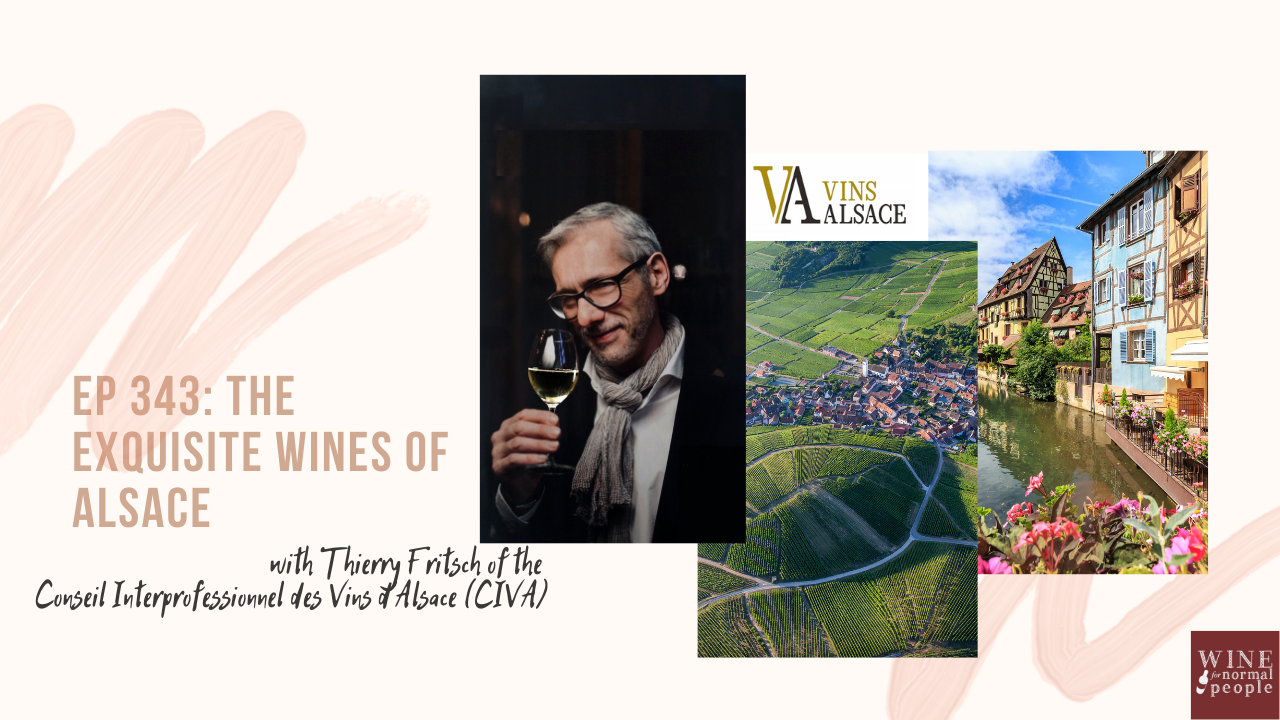Ep 343: The Exquisite Wines of Alsace with Thierry Fritsch of the Conseil Interprofessionnel des Vins dAlsace (CIVA)

b'
 In this show, we welcome Thierry Fritsch, the head oenologist and chief wine educator of the Conseil Interprofessionnel des Vins d\\u2019Alsace (CIVA), the regional wine regulatory and promotional body of the Alsace wine region. Born and raised in Alsace, Thierry is an agricultural engineer and oenologist, and has an MBA from the Business School of Lyon. Prior to joining the CIVA in 1997, he worked as Chef de Cave for Pierre Sparr and Josmeyer in Alsace. \\xa0
In this show, we welcome Thierry Fritsch, the head oenologist and chief wine educator of the Conseil Interprofessionnel des Vins d\\u2019Alsace (CIVA), the regional wine regulatory and promotional body of the Alsace wine region. Born and raised in Alsace, Thierry is an agricultural engineer and oenologist, and has an MBA from the Business School of Lyon. Prior to joining the CIVA in 1997, he worked as Chef de Cave for Pierre Sparr and Josmeyer in Alsace. \\xa0
Thierry is a lively and fascinating guest. He shared so much about the region and the innovations in the works! Below are the show notes:
- Thierry tells us about his background and about the history of Alsace. We discuss how his grandfather changed nationalities 5 times in his life (!). We talk about how the epic tennis match, as I call it, between Germany and France (with Alsace as the ball) shaped the region culturally and from a grape and wine standpoint.
\\xa0
- We discuss one of the unique factors about Alsace \\u2013 that winemaking families here have been involved longer than any other region in France \\u2013 for 13, 14, or even 15 generations. Thierry tells us about the wine families\\u2019 strong passion for the region and how that has led to a focus on quality and sustainability and organic and biodynamics in the vineyard (Alsace is 25% organic, the leader in France)
- Thierry tells us about the climate and land of Alsace \\u2013 the effect of the Vosges Mountains, how the area is one of the driest and sunniest in France, how climate changed has pushed harvest up by a month and a half, and Alsace\\u2019s secret sauce is its 13 different soil types, each yielding different wine types. Thierry tells us of the three main terroir types in Alsace \\u2013 the slopes of the Vosges, the foothills, and the flats \\u2013 and how, as with all hillside regions in France, foothills/mid slope are best, followed by slopes and then the flats, which are used for everyday wines.
\\xa0
- The current appellation system in Alsace (AOC Alsace, plus 51 Grand Cru) is quite simple now, but Thierry shares some exciting developments that are in the works and will happen in the next decade (with the INAO, the French regulatory body, it takes a very long time) \\u2013 new tiers in the AOC that include villages and a premier cru level.
\\xa0
- We end by talking about the beautiful wines. Thierry describes the main wines of Alsace and what makes them so special: Riesling, Gewurztraminer, Pinot Gris, Pinot Blanc, Muscat, Pinot Noir, and the very popular Cr\\xe9mant d\\u2019Alsace.

- One of the issues with Alsace in recent years has been producers making sweet wines without indicating it on the bottle. Beginning next year the sweetness scale will be on every bottle, to indicate Sec (dry), demi-sec (off-dry), moelleux (semi-sweet), and doux (sweet).
\\xa0
To learn more about Alsace, visit: https://www.vinsalsace.com/en/
\\xa0
During the show I mention the class I\\u2019m teaching on Alsace. You can register for that at www.winefornormalpeople.com/classes if you\\u2019re reading this before September 25, 2020 and catch it on my YouTube channel afterwards!
_____________________________________________________
Thanks to our sponsors this week:
Visit: www.wineaccess.com/normal\\xa0and for a limited time get $20 off your first order of $50 or more!\\xa0
Wine Access is a\\xa0web site that has exclusive wines that overdeliver for the price (of which they have a range).\\xa0Check out their awesome wine site with fantastic, hard to find wines -- you won\'t regret it!\\xa0
\\xa0
Thanks to\\xa0YOU!\\xa0The podcast supporters on Patreon:
https://www.patreon.com/winefornormalpeople
\\xa0
\\xa0
'